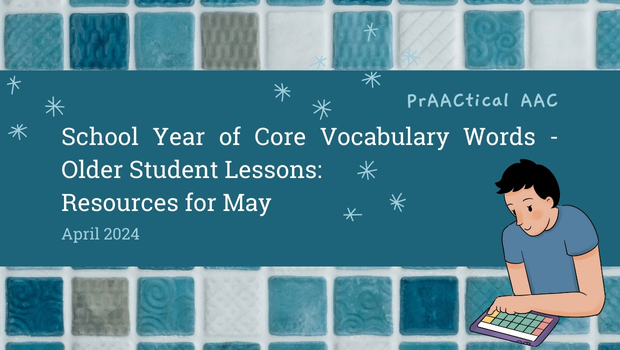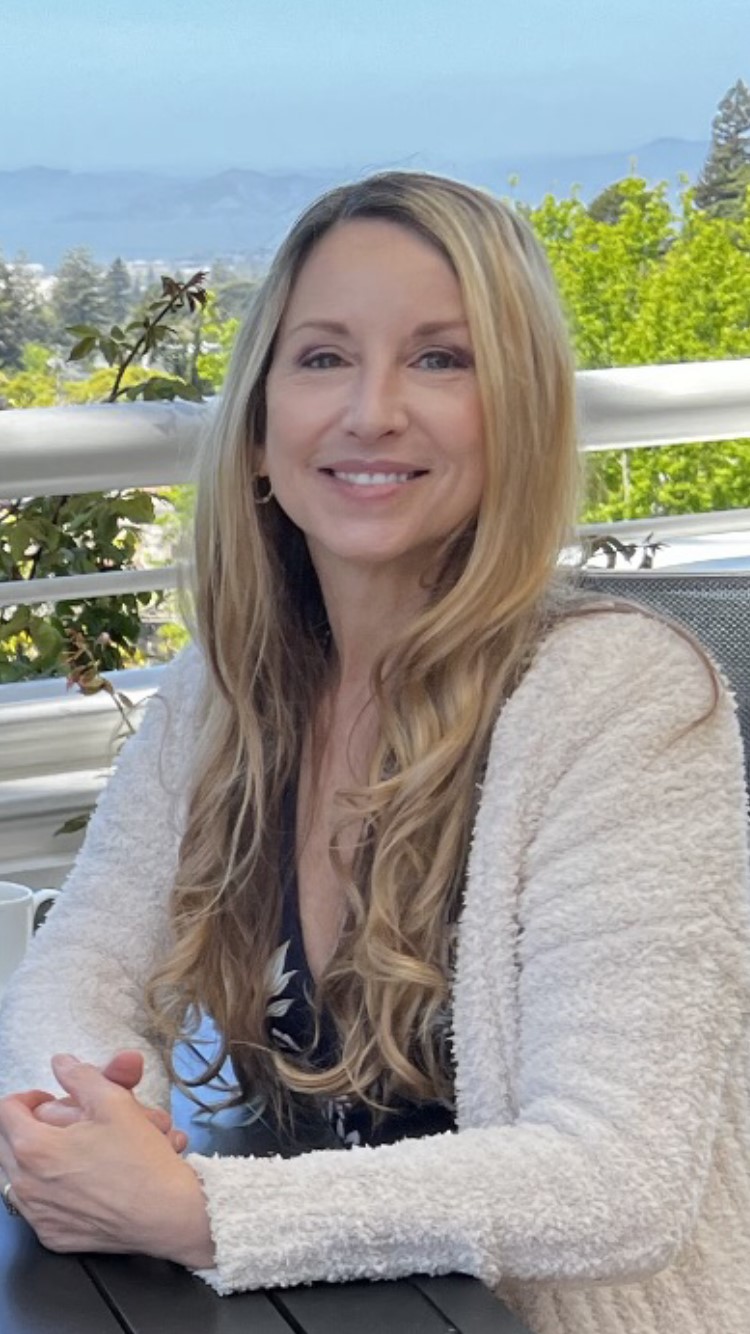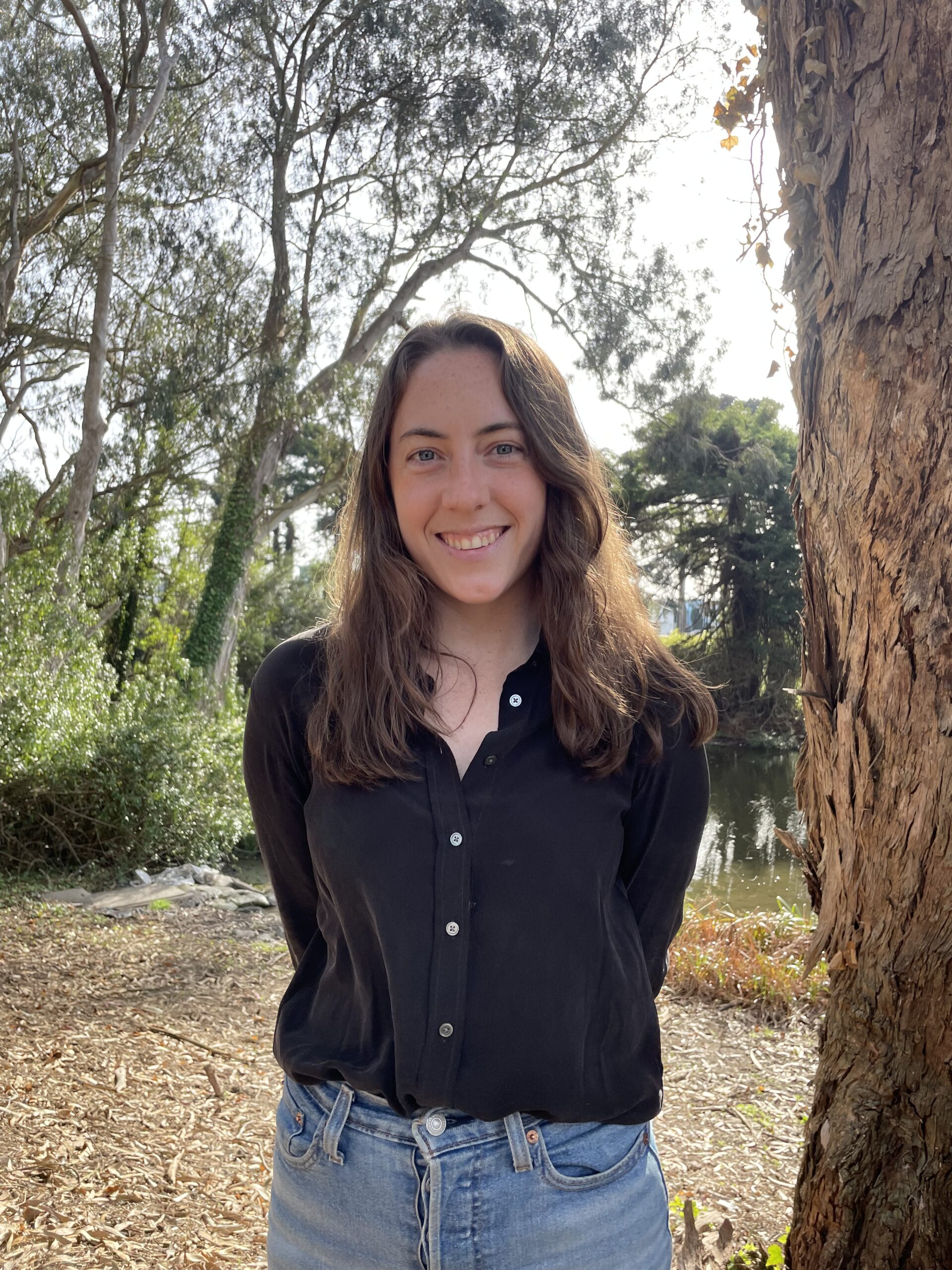School Year of Core Vocabulary Words – Older Student Lessons: AAC Resources for May

It’s prAACtically May! Guest authors Michaela Sullivan and Lindsay Dougherty are back with wonderful ideas for your older students who are building their skills with core vocabulary. Don’t miss the slide decks full of activities and the data collection forms specific to the May core words. In this post, they also discuss how the Participation Model and participation planning can support our AAC practices.
SCHOOL YEAR OF CORE- Older Student Lessons
Access & Copy below:
INTRODUCTION- MAY 2024
Welcome back to the School Year of Core – Older student lessons- May!
Summer is on the horizon, and we are kicking off the month of May with new core words and themes such as Mother’s Day, Memorial Day, Cinco De Mayo, Climate change, recycling, thrifting, reflections of the year, planning for trips and the summer, new interests and hobbies, ways to relax, animals, and camping. We hope you enjoy the activities and resources provided and that they continue to impact and foster core language vocabulary growth for you and those you serve.
We continue to encourage your honest feedback about the lessons, what has been helpful, and what could be improved. We want this project to continually grow and change. If you have adapted the SYOC – OSLs in any way, please feel free to share! We would love to add your genius to our collection of resources. Please email us at schoolyearofcore@gmail.com. We will be looking forward to hearing from you all.
We hope that your learners enjoy the activities offered in the May, Weeks 1-2 and Weeks 3-4 Google Slide Decks. Once you make copies of the Slide Decks, they can be easily modified and adapted to meet your individual student/learner needs, (or remain just as they are).
We suggest that you download the corresponding Symbol Charts containing May Level 1 and Level 2 words to help navigate and organize your lessons. They can also be used as hands-on low tech resources.
Because we have provided over 150 slides for the month of May, it would be impossible to complete all of the activities in one month. Our motto is, “take what you want and leave the rest.” Think of this as an activity buffet, where the leftovers are always fresh, and can always serve as a back-up plan. 🙂
We have provided a variety of resources to give you a greater chance of finding activities to meet your diverse student(s) needs and interests. Please note that although these resources were created for AAC users, they can be utilized effectively with a variety of students. We hope that you and your students/adults enjoy these resources created in modifiable Google Slides.
All Slide Decks contain:
- Icebreaker Activities, (e.g. Jokes, Would You Rather, National days)
- Monthly Language Resources Include:
- “Tell us a Story” slides: to support students to co-construct narratives about past experiences using meaningful photos given WH question scaffolds.
- “Get Off the Computer” suggestions for Shared Reading and Share a Word to Describe your Day: We added a few slides with Shared Reading suggestions and a topic/interest inventory where students/adults can share the topics they are most interested in.
- Self Care: We will review different topics through the lens of self care.
- Student Reflection Time: students can use a visual rating scale to share whether or not they enjoyed an activity.
- Topics: Students will share if they agree or disagree with statements, as well as answer questions related to topics of the month.
- Symbol charts: include icons from a wide array of communication systems.
- Feelings Check-In: Including sentence frames and visuals
- Weekend reflection: Including visual icons and options.
- Music Choices: Listen to music corresponding to themes and core words
- Media: animated shorts and short, educational video clips
- Predictable chart writing
- Reading
- The Strategy of the Month is The Participation Model and Participation Plans.
We hope you enjoy the School Year of Core-Older Student Lessons for MAY.
THE WORDS
Weeks 1-2:
- Level 1 Words: now, ready, to, with, push, pull, same, different
- Level 2 Words: few, many, above, below, through, really, comfortable, uncomfortable
Weeks 3-4:
- Level 1 Words: top, bottom, some, all
- Level 2 Words: terrible, wonderful
THE SYMBOLS
You can download grids with the symbols for this month’s words from the lists below. These handy visual tools can help us remember what words to focus on and be useful in our intervention and instruction.
Level 1 Words
- Avaz
- CoughDrop
- LAMP Words for Life
- Wordpower 60 Basic
- Unity 45 Sequenced
- Unity 60 Sequenced
- Unity 84 Sequenced
- Blank Grid (add your own symbols)
Level 2 Words
- Avaz
- CoughDrop
- LAMP Words for Life
- Wordpower 60 Basic
- Unity 45 Sequenced
- Unity 60 Sequenced
- Unity 84 Sequenced
- Blank Grid (add your own symbols)
The Google Slide Resources
Weeks 1-2 and Weeks 3-4 can be downloaded below.
Strategy of the month: PARTICIPATION MODEL/PARTICIPATION PLANS
Once students begin utilizing their recommended AAC systems (whether low or high-tech), educational and therapeutic teams often focus on how and when such systems can be implemented and utilized meaningfully throughout the day. Sometimes, teams create Participation Plans, which can help guide and outline the process. The specific approach is as different and as unique as each communicator, and the strengths and needs of the individual and the team must be taken into consideration to ensure that OPPORTUNITY BARRIERS (usually imposed by the people in the environment) and ACCESS BARRIERS (which can be related to the individual who uses AAC) do not deter progress. (Beukelman & Mirenda, 1988; 2013)
Resources
Please find the following additional resources on The Participation Model below. These resources may be helpful for individual learning and/or for team training.
- 11.4.20 PARTICIPATION MODEL: PLANNING FOR AAC IMPLEMENTATION with Erin Sheldon, Courtesy of OTAP-RSOI (We hope you enjoy the 1 hour and 21 minute session discussing this topic.
- Teach 4 OI- Please take a look at this comprehensive website that provides many resources to support participation.
- Video of the Week: Using the AAC Participation Model to Guide Implementation, by Kelly Fonner, Education and Assistive Technology Consultant, AAC in the Cloud Conference, 2019
- Participation Plans in Classroom Settings Worksheet, courtesy of Kelly Fonner, 2003
- Strategy of the Month: Building Participation by Carole Zangari, PrAACtical AAC, October 5, 2013
- PrAACtical AAC Strategy of the Month: Classroom Participation by Carole Zangari October 19, 2013
- How We Do It: AAC in the Special Education Classroom by Angi Pearce, a teacher at Kowhai Special School in Hastings, New Zealand, PrAACtical AAC, October 5, 2013
- Building Participation with Older Learners, by Robin Parker, 2013, PrAACtical AAC
- Implementation Strategies for Building Communication and Learning through AAC in the Classroom by Christy Butler, SLP; and Anne Kuhlmeier, SLP
A special thank you to Edna-Jo Piccirillo for collaborating on this strategy!
DATA COLLECTION & ACCOUNTABILITY FORMS
Taking data to measure performance and keeping track of our own modeling behavior are two things we can do to strengthen our AAC teaching. Here are some forms that you can use to support those efforts.
This posting is dedicated to all of the amazing Educators, SLP’s, parents and therapists who are making a difference every day!
About the School Year of Core-Older Student Lessons Series Authors
 Michaela Sullivan is an SLP who specializes in the fields of AAC and AT. She currently works within the San Francisco Unified School District on the AAC Support Team where she supervises graduate student interns, works in a transition program and on special projects. Ms. Sullivan also has a private practice. She has been a presenter in the field of Speech-Language Pathology and AAC at state and national conventions. She was one of the creators of the Original School Year of Core first released in 2020 on the websites: PrAACtical AAC and AAC Language Lab. Ms. Sullivan works closely with San Francisco State with Project AAC for ALL, SYOC Bilingue and the TRAAC Project. Ms. Sullivan serves as a Board member, Treasurer and Volunteer for the Nika Project, providing services, supports, resources, training, and repurposed equipment to help meet the needs of individuals who use AAC systems both locally and internationally.
Michaela Sullivan is an SLP who specializes in the fields of AAC and AT. She currently works within the San Francisco Unified School District on the AAC Support Team where she supervises graduate student interns, works in a transition program and on special projects. Ms. Sullivan also has a private practice. She has been a presenter in the field of Speech-Language Pathology and AAC at state and national conventions. She was one of the creators of the Original School Year of Core first released in 2020 on the websites: PrAACtical AAC and AAC Language Lab. Ms. Sullivan works closely with San Francisco State with Project AAC for ALL, SYOC Bilingue and the TRAAC Project. Ms. Sullivan serves as a Board member, Treasurer and Volunteer for the Nika Project, providing services, supports, resources, training, and repurposed equipment to help meet the needs of individuals who use AAC systems both locally and internationally.
 Lindsay Dougherty is a Speech & Language Pathologist with specializations in Autism and AAC. She currently works for the San Francisco Unified School District, providing direct services to students with complex communication needs and supporting her fellow SLPs on the AAC Support Team. Lindsay works on a team of professionals, implementing a Language Systems First curriculum for Pre-K and Kindergarten classrooms across the school district. The team provides a universal language system, staff and parent training, and AAC support to teachers and SLPs. She is also the faculty advisor of her middle school’s Best Buddies Club, where she supports students with disabilities in building meaningful friendships with peers.
Lindsay Dougherty is a Speech & Language Pathologist with specializations in Autism and AAC. She currently works for the San Francisco Unified School District, providing direct services to students with complex communication needs and supporting her fellow SLPs on the AAC Support Team. Lindsay works on a team of professionals, implementing a Language Systems First curriculum for Pre-K and Kindergarten classrooms across the school district. The team provides a universal language system, staff and parent training, and AAC support to teachers and SLPs. She is also the faculty advisor of her middle school’s Best Buddies Club, where she supports students with disabilities in building meaningful friendships with peers.
Our Featured Core Contributors for the month of May are Jadine Veluya, Christelle Marcelo, and Joseph Cachapero.
Filed under: Featured Posts
This post was written by Carole Zangari

1 Comment
Incredibly helpful. Where can we follow to get eachs months next lesson plan?